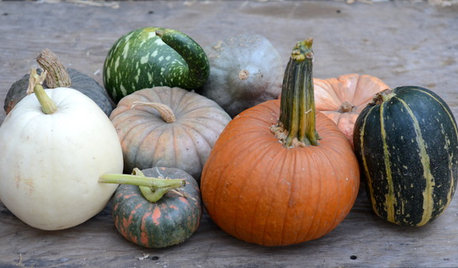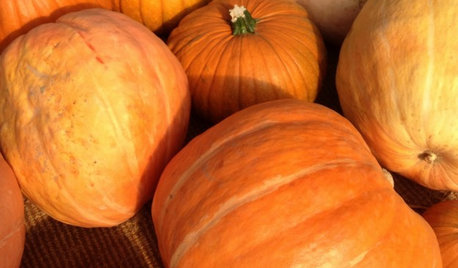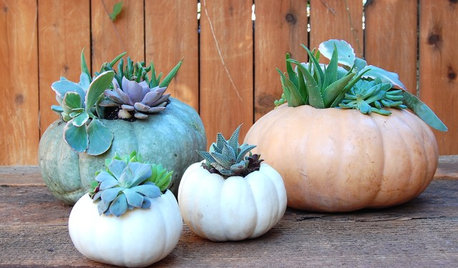My pie pumpkins are turning orange
Auther
9 years ago
Related Stories

ORANGETreat Your Rooms to Pumpkin Pie Orange
Stir some pumpkin colors into your interiors for design deliciousness that lasts well beyond Thanksgiving
Full Story
MOST POPULARFalling for Color: 9 Ways With Pumpkin Orange
From racing stripes to accent walls, see how to work this vibrant hue into your home
Full Story
DECORATING GUIDESPretty Up Pumpkins With Paint
Put down the carving knife — we've got a better way to prep your pumpkins for Halloween
Full Story
GARDENING GUIDESJoin Us for a Parade of Pumpkins
Fall eye candy: Get to know 9 winter squash varieties, including Long Island Cheese and Blue Hubbard
Full Story
EDIBLE GARDENSSummer Crops: How to Grow Pumpkins
Start in spring to grow your own fall decorations and have plenty left for pies
Full Story
DECORATING GUIDES10 Ways to Decorate With Pumpkins Around the House
A bright orange pumpkin or its albino cousin makes the easiest Halloween decoration ever
Full Story
DIY PROJECTSDIY: Pumpkins and Succulents Combine as Holiday Decor
Follow this easy tutorial to turn your favorite pumpkins into a fresh update for your home or a gift item
Full Story
PRODUCT PICKSGuest Picks: Pi Day + Pie Stuff = Yummy Fun
Add these tools and accessories to your baking arsenal and watch smiles multiply
Full Story
COLORColor Feast: When to Use Orange in the Dining Room
Dial up the zest at mealtimes with doses of snappy orange on dining room walls and furniture
Full Story
HOUZZ TOURSMy Houzz: Turning a Netherlands Barn Into a Country Home
Once a place for chilling milk, this Dutch home now lets the owners chill out in easygoing comfort
Full StorySponsored
More Discussions






Okiedawn OK Zone 7
AutherOriginal Author
Related Professionals
Sand Springs Landscape Architects & Landscape Designers · Fairhope Landscape Contractors · Fort Wayne Landscape Contractors · Hoover Landscape Contractors · Huntington Landscape Contractors · Melrose Landscape Contractors · Mesa Landscape Contractors · Post Falls Landscape Contractors · Roseville Landscape Contractors · Selden Landscape Contractors · Palos Hills Landscape Contractors · Ankeny Decks, Patios & Outdoor Enclosures · Orange County Decks, Patios & Outdoor Enclosures · Pittsburgh Decks, Patios & Outdoor Enclosures · Westfield Decks, Patios & Outdoor EnclosuresOkiedawn OK Zone 7
AutherOriginal Author
Okiedawn OK Zone 7
AutherOriginal Author
Okiedawn OK Zone 7